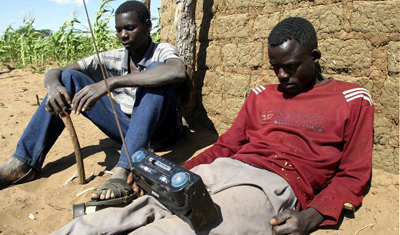Zimbabwean police seize radios in run-up to elections
| Publisher | Committee to Protect Journalists |
| Publication Date | 28 February 2013 |
| Cite as | Committee to Protect Journalists, Zimbabwean police seize radios in run-up to elections, 28 February 2013, available at: https://www.refworld.org/docid/513dd1f923.html [accessed 20 May 2023] |
| Disclaimer | This is not a UNHCR publication. UNHCR is not responsible for, nor does it necessarily endorse, its content. Any views expressed are solely those of the author or publisher and do not necessarily reflect those of UNHCR, the United Nations or its Member States. |
Nairobi, February 28, 2013 – Zimbabwean authorities' seizure of hand-cranked and solar-powered radios distributed by nongovernmental organizations prevents local citizens from accessing diverse sources of information in the run-up to the country's general elections in July, the Committee to Protect Journalists said today.
 Local Zimbabweans often use radios to hear news coverage of elections. (Reuters/Emmanuel Chitate)
Local Zimbabweans often use radios to hear news coverage of elections. (Reuters/Emmanuel Chitate)
Innocent Matibiri, the police deputy commissioner, told a parliamentary committee on Monday that any individuals involved in the distribution of the radios would be arrested, news reports said. In a press conference on February 19, Charity Charamba, police chief spokesman, said police had already confiscated "specially designed radios" from the offices of the Zimbabwe Peace Project, a local human rights group headed by former journalist Jestina Mukoko, the state-run daily Herald reported. Charamba accused the group of possessing "gadgets that it is using to promote hate speech against certain political parties," the pro-government Patriot reported.
NGOs have distributed hand-cranked and solar-powered radios in Zimbabwe since 2005, but the ruling Zimbabwean African National Union-Patriotic Front (ZANU-PF)-led government has a pattern of cracking down on such devices ahead of election cycles, according to local journalists. The crackdown is a fear tactic used against independent organizations critical of President Robert Mugabe ahead of the constitutional referendum scheduled in March and the general elections scheduled for July, the journalists said. In recent weeks, police raids on the offices of independent NGOs and political violence against the opposition have heightened tension, according to news reports.
"The confiscation of these radios shows to what lengths the Zimbabwean authorities will go to try to keep their citizens in the dark," said CPJ's Africa Advocacy Coordinator Mohamed Keita from New York. "Zimbabweans have a right to a wide variety of information, especially ahead of elections. This ban must be lifted immediately."
The confiscations have come under fire from local and international press freedom and human rights groups. The Zimbabwe Lawyers for Human Rights association has called the ban illegal and said the confiscation of radios from the public violates the right to receive and impart information as guaranteed under the constitution, according to local news reports.
